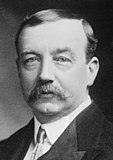The January 1910 United Kingdom general election was held from 15 January to 10 February 1910. The government called the election in the midst of a constitutional crisis caused by the rejection of the People's Budget by the Conservative-dominated House of Lords, in order to get a mandate to pass the budget.
| ||||||||||||||||||||||||||||||||||||||||||||||||||||||||||||||||||||||||||||||||||
All 670 seats in the House of Commons 336 seats needed for a majority | ||||||||||||||||||||||||||||||||||||||||||||||||||||||||||||||||||||||||||||||||||
|---|---|---|---|---|---|---|---|---|---|---|---|---|---|---|---|---|---|---|---|---|---|---|---|---|---|---|---|---|---|---|---|---|---|---|---|---|---|---|---|---|---|---|---|---|---|---|---|---|---|---|---|---|---|---|---|---|---|---|---|---|---|---|---|---|---|---|---|---|---|---|---|---|---|---|---|---|---|---|---|---|---|---|
| Turnout | 86.8% | |||||||||||||||||||||||||||||||||||||||||||||||||||||||||||||||||||||||||||||||||
| ||||||||||||||||||||||||||||||||||||||||||||||||||||||||||||||||||||||||||||||||||
 Colours denote the winning party | ||||||||||||||||||||||||||||||||||||||||||||||||||||||||||||||||||||||||||||||||||
 Composition of the House of Commons following the election. | ||||||||||||||||||||||||||||||||||||||||||||||||||||||||||||||||||||||||||||||||||
| ||||||||||||||||||||||||||||||||||||||||||||||||||||||||||||||||||||||||||||||||||
The general election resulted in a hung parliament, with the Conservative Party led by Arthur Balfour and their Liberal Unionist allies receiving the most votes, but the Liberals, who were now led by H. H. Asquith following the death of Henry Campbell-Bannerman in 1908, winning the most seats, returning two more MPs than the Conservatives. Asquith's government remained in power with the support of the Irish Parliamentary Party, led by John Redmond. Another general election was soon held in December.
The Labour Party, led by Arthur Henderson, returned 40 MPs. Much of this apparent increase (from the 29 Labour MPs elected in 1906) came from the defection, a few years earlier, of Lib Lab MPs from the Liberal Party to Labour.
Results edit

| Candidates | Votes | ||||||||||
|---|---|---|---|---|---|---|---|---|---|---|---|
| Party | Leader | Stood | Elected | Gained | Unseated | Net | % of total | % | No. | Net % | |
| Conservative and Liberal Unionist | Arthur Balfour | 594 | 272 | 130 | 14 | +116 | 40.6 | 46.8 | 2,919,236 | +3.4 | |
| Liberal | H. H. Asquith | 511 | 274 | 12 | 135 | −123 | 40.9 | 43.5 | 2,712,511 | −5.4 | |
| Labour | Arthur Henderson | 78 | 40 | 17 | 6 | +11 | 6.0 | 7.0 | 435,770 | +2.1 | |
| Irish Parliamentary | John Redmond | 85 | 71 | 0 | 11 | −11 | 10.6 | 1.2 | 74,047 | +0.6 | |
| All-for-Ireland | William O'Brien | 10 | 8 | 8 | 0 | +8 | 1.2 | 0.4 | 23,605 | ||
| Independent Nationalist | N/A | 10 | 3 | 3 | 2 | +2 | 0.5 | 0.3 | 16,533 | ||
| Social Democratic Federation | H. M. Hyndman | 9 | 0 | 0 | 0 | 0 | 0.2 | 13,479 | −0.1 | ||
| Ind. Conservative | N/A | 4 | 1 | 1 | 1 | 0 | 0.1 | 0.2 | 11,772 | ||
| Free Trader | John Eldon Gorst | 4 | 0 | 0 | 0 | 0 | 0.2 | 11,553 | |||
| Independent Labour | N/A | 6 | 0 | 0 | 1 | −1 | 0.2 | 9,936 | |||
| Independent Liberal | N/A | 3 | 1 | 1 | 0 | +1 | 0.1 | 0.1 | 5,237 | ||
| Scottish Prohibition | Edwin Scrymgeour | 1 | 0 | 0 | 0 | 0 | 0.0 | 756 | |||
Voting summary edit
Seats summary edit
See also edit
References edit
- ^ All parties shown.
- ^ "General Election Results 1885-1979". Archived from the original on 30 January 2012. Retrieved 13 February 2023.
- Blewett, Neal (1972), The Peers, the Parties and the People: The General Elections of 1910[publisher missing]
- Clarke, P. F. (1975), "The electoral position of the Liberal and Labour parties, 1910–1914", English Historical Review, 90 (357): 828–836, doi:10.1093/ehr/xc.ccclvii.828
- Craig, F. W. S. (1989), British Electoral Facts: 1832–1987, Dartmouth: Gower, ISBN 0900178302
- O'Brien, Phillips Payson (2010), "The 1910 Elections and the Primacy of Foreign Policy", in Mulligan, William; Simms, Brendan (eds.), The Primacy of Foreign Policy in British History, 1660–2000, Palgrave Macmillan UK, pp. 249–259
- Pelling, Henry (1967), Social Geography of British Elections 1885–1910[publisher missing]
- Sykes, Alan (1979), Tariff Reform in British Politics: 1903–1913, Oxford University Press
- Sykes, Alan (1975), "The Confederacy and the purge of the Unionist free traders, 1906–1910", Historical Journal, 18 (2): 349–366, doi:10.1017/S0018246X00023724
- Wald, Kenneth D. (1978), "Class and the vote before the first world war", British Journal of Political Science, 8 (4): 441–457, doi:10.1017/S0007123400001496
External links edit
- Spartacus: Political Parties and Election Results
- United Kingdom election results—summary results 1885–1979 Archived 30 January 2012 at the Wayback Machine




